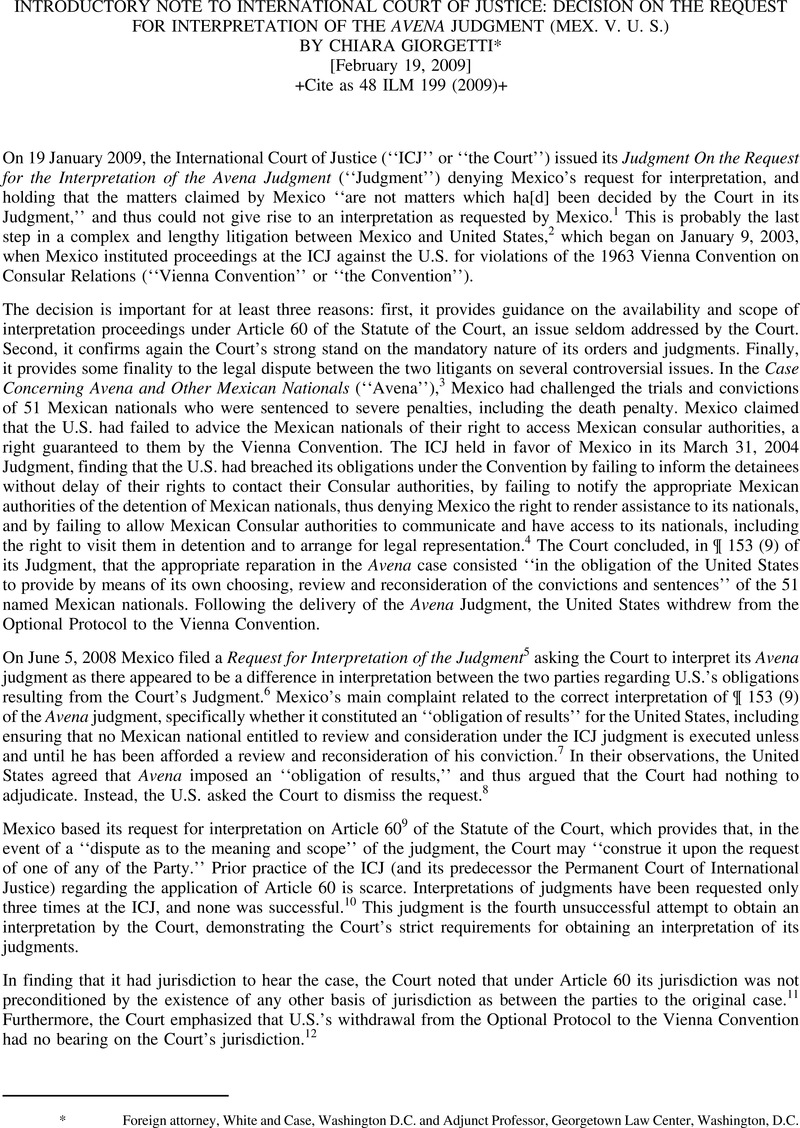No CrossRef data available.
Published online by Cambridge University Press: 27 February 2017

* This text was reproduced and reformatted from the text appearing at the International Court of Justice website: (visited March 10, 2009) <http://www.icj-cij.org/docket/files/139/14939.pdf>
1 Request for Interpretation of the Judgment of 31 March 2004 in the Case Concerning Avena and Other Mexican Nationals (Mex. v. U.S.), (Judgment of Jan. 19, 2009), 47 I.L.M. 726 (2008), available at http://www.icj-cij.org/docket/files/139/14939.pdf?PHPSESSID=94e28db370598fd1783180df60632c8e (last visited Feb. 26, 2009), ¶ 61 (1) [hereinafter Judgment].
2 In fact, prior to the case brought by Mexico in 2003, Paraguay and Germany had both brought cases to the ICJ complaining of the U.S.’s failure to provide consular notification under the Vienna Convention. The ICJ was requested, and had granted, provisional measures in both cases. See Application of the Government of Paraguay (Apr. 3, 1998), available at http://www.icj-cij.org/docket/files/99/7183.pdf (last visited Feb. 26, 2009); Case Concerning the Vienna Convention on Consular Relations (Para v. U.S.) 1998 I.C.J. 248 (Apr. 9); Request for Provisional Measures, 1998 I.C.J. Rep. 11 (Apr. 9); Application Instituting Proceedings Submitted by the Federal Republic of Germany (Mar. 2, 1999), available at http://www.icj-cij.org/docket/files/104/7153.pdf (last visited Feb. 26, 2009); and LaGrand (Ger. v. U.S.), 2001 I.C.J. 466 (June 27).
3 Case Concerning A vena and Other Mexican Nationals (Mex. v. U.S.), (Judgment of Mar. 31, 2004), 2004 I.C.J. 12 [hereinafter Avena].
4 Id. ¶ 153.
5 See Judgment, supra note 1.
6 Mexico requested, on June 5, 2008, and obtained by Order of the Court of July 16, 2008, preliminary measures requesting the U.S. to ensure that certain named individuals were not executed pending the judgment on the Request for Interpretation. See Request for Interpretation (Mex. v. U.S.), (Order of July 16, 2008), available at http://www.icj-cij.org/docket/files/139/14639.pdf (last visited Feb. 26, 2009); see also comment by author in 47 I.L.M. 723 (2008).
7 Judgment, supra note 1, 19.
8 Id. ¶ 10.
9 The full text of Article 60 states ‘‘The Judgment is final and without appeal. In the event of dispute as to the meaning or scope of the judgment, the Court shall construe it upon the request of any party.’’ The Statute of the Court is available at www.icj-cij.org.
10 In the Request for Interpretation of the Judgment of 20 November 1950 in the Asylum Case, 1950 I.C.J. 395 (Nov. 27), the Court held that the interpretation requested went beyond the limits of the original judgment. In the Application for Revision and Interpretation of the Judgment of 24 February 1982 in the Case Concerning the Continental Shelf (Tunis v. Libya), 1985 I.C.J. 192 (Dec. 10), the Court concluded that the request was inadmissible in the relevant parts. Finally, in the Request for Interpretation of the Judgment of June 1998 in the Case concerning the Land and Maritime Boundary between Cameroon and Nigeria, 1999 I.C.J. 31 (Mar. 25), the Court concluded that no interpretation was needed. See K. Oellers-Frahm, Interpretation of Judgments of International Courts and Tribunals, in MAX PLANCK ENCYCLOPEDIA OF PUBLIC INTERNATIONAL LAW (Rüdiger Wolfrum ed., 2009).
11 Judgment, supra note 1, 1 15.
12 Id.
13 Id. ¶ 29.
14 Id. ¶¶ 30–42.
15 Id. ¶ 44.
16 Id. ¶ 45.
17 Id. ¶ 46-47.
18 Id ¶ 53.
19 Id. ¶ 57.
20 Id. ¶ 59.
21 Id. ¶ 60.